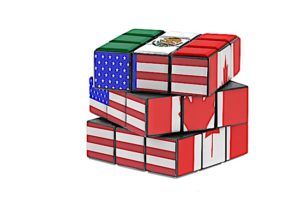News & Insights
Senate Overwhelmingly Passes USMCA, Entry into Force Expected in Mid-2020
On January 16, 2020, the U.S. Senate passed the US-Mexico-Canada Agreement (“USMCA”), which modifies, updates and will replace the North American Free Trade Agreement (“NAFTA”). The Senate vote was 89-10 in favor of the updated trade agreement. President Trump is expected to sign the implementing bill this week. Canada is expected to ratify the agreement later this month. Mexico was the first to ratify agreement in June 2019, but it will need to approve subsequent revisions that were made to the agreement by the United States. It is anticipated that the USMCA will formally enter into force sometime in mid-2020. When that happens, U.S. implementing regulations will be published in the Federal Register.
The following provides a summary of the key modifications and updates made by the USMCA—
| Certification of Origin |
Importers will no longer be required to use a specific certificate of origin form for goods subject to NAFTA qualification claims.
|
|
De Minimis Levels for Exports to Canada and Mexico
|
· Canada will raise its de minimis level from C$20 to C$40 for taxes. · Canada will also provide for duty-free shipments up to C$150. · Canada will also allow a period of 90 days after entry for the importer to make payment. · Mexico will continue to provide US$50 tax free de minimis. · Mexico will also provide duty-free shipments up to US$117. · Shipment values up to these levels would enter with minimal formal entry procedures. |
| Textile and Apparel | · New rules of origin apply to sewing thread, narrow elastic fabrics, pocketing and coated fabrics. · Tariff Preference Levels (TPLs) have been modified. · USMCA permits the use of rayon fibers and visible lining fabrics not available in North America. · De miminis threshold increased from 7% to 10%. · There will be a transition period for the new origin rules. · USMCA provides for textile-specific enforcement procedures. |
| Automotive and Manufacturing | · New RVC of 75% (vs 62.5% under the NAFTA) for core, principal and complementary parts. · 70% of auto producers’ steel and aluminum purchases must be North American originating.· Producers will no longer be allowed to “deem” non-North American content as originating. · New Labor Value Content Rule (40%-45% of autos must be made by employees paid $16/hour). · New origin rules for chemicals, glass, optical fibers. · New origin certification, verification and enforcement rules. · Prohibitions on preferences for local distributors for imports. |
| Agriculture | · Elimination of Canadian Milk Classes 6 and 7. · New Canadian Tariff Rate Quotas for certain U.S. chicken, eggs, turkey and dairy. · U.S. will give reciprocal access to Canadian dairy products, peanuts, sugar, etc. · Elimination of Canadian Grading of U.S. Wheat Products. · Canada will apply export charges to certain dairy products and infant formulas. · Elimination of Canadian restrictions on sale and distribution of alcoholic beverages. · Elimination of Mexico’s restrictions on sales and distribution of U.S. cheeses. |
| Digital Trade | · Prohibitions on duties and discriminatory measures on digital products sold electronically. · The use of electronic authentication and electronic signatures permitted. · Crackdowns on data localization measures used to restrict where data is stored and processed. · Prohibitions on forced disclosure of proprietary computer source code and algorithms. · Enforceable consumer protections (e.g., privacy, unsolicited communications). |
| IPR | · Full national treatment for copyright and related rights. · Copyright term of life of author +70 years or publication +75 years. · Copyright safe harbors to deter online piracy. · Application of enforcement measures to the digital environment. · Minimum 15-year protection for industrial designs. · Mandatory patent term extension for unreasonable patent office and regulatory delays. · Criminal procedures and penalties for camcording. · Civil and criminal trade secret protections against misappropriation by SEO’s. · 10 years of data protection for agricultural chemicals, such as biologic drugs. · Protection against circumvention of technological protection measures. · Ex officio authority for customs officials to stop suspected counterfeit goods. · Criminal penalties and civil remedies be available for both satellite and cable theft. · Application of Doha Declaration on TRIPS and Public Health. |
| Labor | · Labor chapter incorporated into main body of the agreement. · Required adoption and maintenance of core labor standards per the ILO. · Prohibition on imports of goods produced by forced labor (including forced child labor). · Protection of migrant workers under local labor laws. · Prohibition on violence against workers exercising their labor rights. · Required reform of Mexico’s system of labor justice. · Required laws in Mexico for the effective recognition of the right to collectively bargain. · Requirement that Mexico create the conditions for real union democracy. |
| Environment | · Environment chapter incorporated into main body of the agreement. · Prohibition on fish subsidies, including those that benefit vessels or operators of IUU fishing. · Improvement of fisheries management to prevent illegal fishing, overfishing and overcapacity. · Reduction of marine litter. · Prohibition on shark finning and commercial whaling. · Prohibition on the use of poisons and explosives in commercial fishing operations. · Increased transparency of air quality data and information. · Market access for U.S. environment technologies, goods and services. · Minimum penalties for trafficking in wildlife, timber and fish. · Increased customs and border inspections of shipments for trafficking. · Adoption of measures to fulfill obligations under 7 environmental agreements (e.g., CITES, etc.). · Creation of interagency committee to monitor implementation of enforcement actions. |
| Pharmaceuticals | · Removal of 10-year IP protection that would have prevented generic drug competition. · Removal of 3-year IP protection for new uses of previously approved drugs. |
Note that many of the provisions of the NAFTA will remain unchanged in the USMCA, such as—
- Qualifying industrial goods and textiles may continue to be imported duty free into the NAFTA countries;
- NAFTA country business travelers may continue to freely enter the NAFTA territories; and,
- The dispute resolution mechanisms for antidumping and countervailing duty issues remain the same.
Until the date on which the USMCA formally enters into force, the NAFTA rules will continue to be applied and enforced. Miller Proctor Law PLLC will continue to track the implementation and entry into force of the USMCA. If you have any questions relating to the NAFTA requirements, the USMCA or other international trade-related issues, please contact Melissa Proctor (melissa@millerproctorlaw.com) at Miller Proctor Law PLLC (https://millerproctorlaw.com ).
News & Insights

USTR Notifies Congress that USMCA Will Enter into Force on July 1st
Today (April 24, 2020), U.S. Trade Representative (USTR) Robert Lighthizer notified Congress that Canada, Mexico and the United States have taken measures necessary to comply with their commitments under the U.S.-Mexico-Canada Agreement (USMCA), and therefore the Agreement will enter into

NAFTA Is Dead – Long Live the “U.S. – Mexico Trade Agreement” in Principle?
Today, the Office of the U.S. Trade Representative (USTR) announced that the United States and Mexico reached a “preliminary agreement in principle,” subject to finalization and implementation, to update the North America Free Trade Agreement (NAFTA). The USTR stated that


